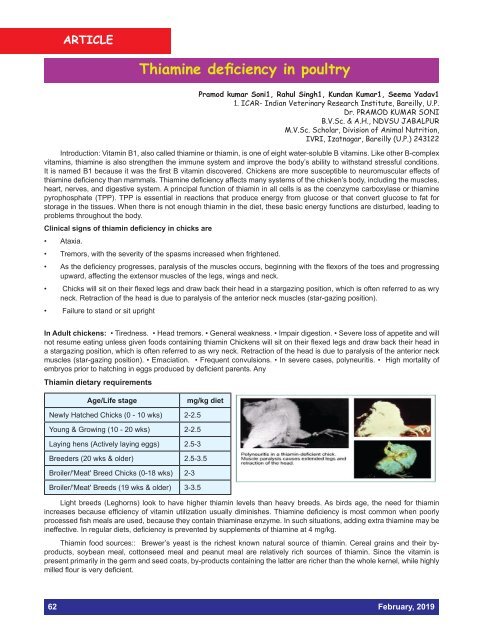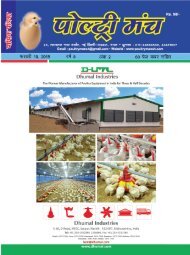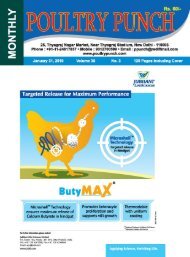POULTRY PUNCH - FEBRUARY 2019
POULTRY PUNCH - FEBRUARY 2019
POULTRY PUNCH - FEBRUARY 2019
- No tags were found...
Create successful ePaper yourself
Turn your PDF publications into a flip-book with our unique Google optimized e-Paper software.
ARTICLE NEWS<br />
EW Nutrition Thiamine marks its deficiency presence in poultry Poultry India 2018<br />
Pramod kumar Soni1, Rahul Singh1, Kundan Kumar1, Seema Yadav1<br />
1. ICAR- Indian Veterinary Research Institute, Bareilly, U.P.<br />
Dr. PRAMOD KUMAR SONI<br />
B.V.Sc. & A.H., NDVSU JABALPUR<br />
M.V.Sc. Scholar, Division of Animal Nutrition,<br />
IVRI, Izatnagar, Bareilly (U.P.) 243122<br />
Introduction: Vitamin B1, also called thiamine or thiamin, is one of eight water-soluble B vitamins. Like other B-complex<br />
vitamins, thiamine is also strengthen the immune system and improve the body’s ability to withstand stressful conditions.<br />
It is named B1 because it was the first B vitamin discovered. Chickens are more susceptible to neuromuscular effects of<br />
thiamine deficiency than mammals. Thiamine deficiency affects many systems of the chicken’s body, including the muscles,<br />
heart, nerves, and digestive system. A principal function of thiamin in all cells is as the coenzyme carboxylase or thiamine<br />
pyrophosphate (TPP). TPP is essential in reactions that produce energy from glucose or that convert glucose to fat for<br />
storage in the tissues. When there is not enough thiamin in the diet, these basic energy functions are disturbed, leading to<br />
problems throughout the body.<br />
Clinical signs of thiamin deficiency in chicks are<br />
• Ataxia.<br />
• Tremors, with the severity of the spasms increased when frightened.<br />
• As the deficiency progresses, paralysis of the muscles occurs, beginning with the flexors of the toes and progressing<br />
upward, affecting the extensor muscles of the legs, wings and neck.<br />
• Chicks will sit on their flexed legs and draw back their head in a stargazing position, which is often referred to as wry<br />
neck. Retraction of the head is due to paralysis of the anterior neck muscles (star-gazing position).<br />
• Failure to stand or sit upright<br />
In Adult chickens: • Tiredness. • Head tremors. • General weakness. • Impair digestion. • Severe loss of appetite and will<br />
not resume eating unless given foods containing thiamin Chickens will sit on their flexed legs and draw back their head in<br />
a stargazing position, which is often referred to as wry neck. Retraction of the head is due to paralysis of the anterior neck<br />
muscles (star-gazing position). • Emaciation. • Frequent convulsions. • In severe cases, polyneuritis. • High mortality of<br />
embryos prior to hatching in eggs produced by deficient parents. Any<br />
Thiamin dietary requirements<br />
Age/Life stage<br />
mg/kg diet<br />
Newly Hatched Chicks (0 - 10 wks) 2-2.5<br />
Young & Growing (10 - 20 wks) 2-2.5<br />
Laying hens (Actively laying eggs) 2.5-3<br />
Breeders (20 wks & older) 2.5-3.5<br />
Broiler/'Meat' Breed Chicks (0-18 wks) 2-3<br />
Broiler/'Meat' Breeds (19 wks & older) 3-3.5<br />
Light breeds (Leghorns) look to have higher thiamin levels than heavy breeds. As birds age, the need for thiamin<br />
increases because efficiency of vitamin utilization usually diminishes. Thiamine deficiency is most common when poorly<br />
processed fish meals are used, because they contain thiaminase enzyme. In such situations, adding extra thiamine may be<br />
ineffective. In regular diets, deficiency is prevented by supplements of thiamine at 4 mg/kg.<br />
Thiamin food sources:: Brewer’s yeast is the richest known natural source of thiamin. Cereal grains and their byproducts,<br />
soybean meal, cottonseed meal and peanut meal are relatively rich sources of thiamin. Since the vitamin is<br />
present primarily in the germ and seed coats, by-products containing the latter are richer than the whole kernel, while highly<br />
milled flour is very deficient.<br />
62 February, <strong>2019</strong>






